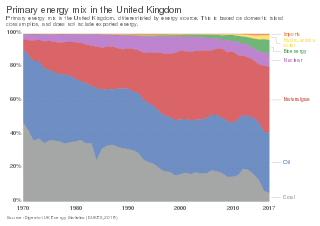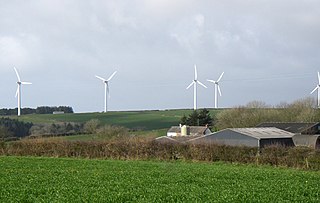External links
- Fossil Fuel Levy Act 1998
- The Fossil Fuel Levy (Amendment) (No. 2) Regulations 2001
- The Fossil Fuel Levy (Scotland) Amendment Regulations 2005
The Fossil Fuel Levy (FFL) is a levy paid by suppliers of electricity from non-renewable energy sources in the United Kingdom. The costs are shared by the suppliers and consumers, as a proportion of the cost is passed on to consumers in the cost of the electricity supplied. The Fossil Fuel Levy was imposed to fund the Non-Fossil Fuel Obligation.
In England and Wales the Fossil Fuel Levy was introduced under the Electricity Act 1989. Section 33 of this Act was briefly superseded by the Fossil Fuel Levy Act 1998 until its repeal (by the Utilities Act 2000), bringing the FFL back under the Electricity Act.
In Scotland, the Fossil Fuel Levy was not imposed until 1996, as support for the nuclear industry in Scotland (the original purpose of the Levy in England and Wales) was provided by the 1990 Scottish 'Nuclear Energy Agreement'.
The Levy has been applied at various rates, but in recent years has been set at zero as the Climate Change Levy was introduced. Rates are controlled by Ofgem.
| England and Wales | |
| April 1, 1990 | 10.6% |
| April 1, 1991 | 11% |
| April 1, 1993 | 10% |
| November 1, 1996 | 3.7% (following the privatisation of British Energy ) |
| April 1, 1997 | 2.2% |
| April 1, 1998 | 0.9% |
| January 1, 1999 | 0.7% |
| October 1, 1999 | 0.3% |
| April 1, 2002 | 0% [ permanent dead link ] |
| Scotland | |
| February 16, 1996 | 0.5% |
| April 1, 1997 | 0.7% |
| April 1, 1998 | 0.8% |
| April 1, 1999? | 0% |
| April 1, 2000 | 0.8% |
| April 1, 2001 | 1.2% [usurped] |
| April 1, 2002 | 0.6% |
| November 1, 2002 | 0% |
The United Kingdom's Climate Change Programme was launched in November 2000 by the British government in response to its commitment agreed at the 1992 United Nations Conference on Environment and Development (UNCED). The 2000 programme was updated in March 2006 following a review launched in September 2004.

The Climate Change Levy (CCL) is a tax on energy delivered to non-domestic users in the United Kingdom.
The Renewables Obligation (RO) was designed to encourage generation of electricity from eligible renewable sources in the United Kingdom. It was introduced in April 2002, both in England and Wales and in Scotland albeit in a slightly different form: the Renewables Obligation (Scotland). The RO was later introduced in Northern Ireland in April 2005. In all cases, replacing the Non-Fossil Fuel Obligation which operated from 1990.

Energy policies are the government's strategies and decisions regarding the production, distribution, and consumption of energy within a specific jurisdiction. Energy is essential for the functioning of modern economies because they require energy for many sectors, such as industry, transport, agriculture, housing. The main components of energy policy include legislation, international treaties, energy subsidies and other public policy techniques.

The Public Utility Regulatory Policies Act is a United States Act passed as part of the National Energy Act. It was meant to promote energy conservation and promote greater use of domestic energy and renewable energy. The law was created in response to the 1973 energy crisis, and one year in advance of a second energy crisis.

Energy in the United Kingdom came mostly from fossil fuels in 2021. Total energy consumption in the United Kingdom was 142.0 million tonnes of oil equivalent in 2019. In 2014, the UK had an energy consumption per capita of 2.78 tonnes of oil equivalent compared to a world average of 1.92 tonnes of oil equivalent. Demand for electricity in 2023 was 29.6 GW on average, supplied through 235 TWh of UK-based generation and 24 TWh of energy imports.

The energy policy of the United Kingdom refers to the United Kingdom's efforts towards reducing energy intensity, reducing energy poverty, and maintaining energy supply reliability. The United Kingdom has had success in this, though energy intensity remains high. There is an ambitious goal to reduce carbon dioxide emissions in future years, but it is unclear whether the programmes in place are sufficient to achieve this objective. Regarding energy self-sufficiency, UK policy does not address this issue, other than to concede historic energy security is currently ceasing to exist.

The United Kingdom is the best location for wind power in Europe and one of the best in the world. The combination of long coastline, shallow water and strong winds make offshore wind unusually effective.

The Climate Change and Sustainable Energy Act 2006 is an Act of the Parliament of the United Kingdom which aims to boost the number of heat and electricity microgeneration installations in the United Kingdom, so helping to cut carbon emissions and reduce fuel poverty.
The Non-Fossil Fuel Obligation (NFFO) refers to a collection of orders requiring the electricity distribution network operators in England and Wales to purchase electricity from the nuclear power and renewable energy sectors. Similar mechanisms operated in Scotland and Northern Ireland.
When the Climate Change Levy was introduced in the United Kingdom, the position of energy-intensive industries was considered, given their energy usage, the requirements of the Integrated Pollution Prevention and Control regime and their exposure to international competition. As a result, a 65% discount from the levy was allowed for those sectors that agreed targets for improving their energy efficiency or reducing carbon emissions. The discount on electricity increased to 90% in 2013.

The availability and uptake of green electricity in the United Kingdom has increased in the 21st century. There are a number of suppliers offering green electricity in the United Kingdom. In theory these types of tariffs help to lower carbon dioxide emissions by increasing consumer demand for green electricity and encouraging more renewable energy plant to be built. Since Ofgem's 2014 regulations there are now set criteria defining what can be classified as a green source product. As well as holding sufficient guarantee of origin certificates to cover the electricity sold to consumers, suppliers are also required to show additionality by contributing to wider environmental and low carbon funds.

Renewable energy in the United Kingdom contributes to production for electricity, heat, and transport.
In the United Kingdom, an electricity supplier is a retailer of electricity. For each supply point the supplier has to pay the various costs of transmission, distribution, meter operation, data collection, tax etc. The supplier then adds in energy costs and the supplier's own charge. Regulation of the charging of customers is covered by the industry regulator Ofgem.
Energy subsidies are measures that keep prices for customers below market levels, or for suppliers above market levels, or reduce costs for customers and suppliers. Energy subsidies may be direct cash transfers to suppliers, customers, or related bodies, as well as indirect support mechanisms, such as tax exemptions and rebates, price controls, trade restrictions, and limits on market access.

An energy certificate or energy attribute certificate is a transferable record or guarantee related to the amount of energy or material goods consumed by an energy conversion device in industrial production. A certificate may be in any form, including electronic, and lists attributes such as method, quality, compliance, and tracking.
Different methods of electricity generation can incur a variety of different costs, which can be divided into three general categories: 1) wholesale costs, or all costs paid by utilities associated with acquiring and distributing electricity to consumers, 2) retail costs paid by consumers, and 3) external costs, or externalities, imposed on society.

Ireland is a net energy importer. Ireland's import dependency decreased to 85% in 2014. The cost of all energy imports to Ireland was approximately €5.7 billion, down from €6.5 billion (revised) in 2013 due mainly to falling oil and, to a lesser extent, gas import prices. Consumption of all fuels fell in 2014 with the exception of peat, renewables and non-renewable wastes.

The Electricity Act 1989 provided for the privatisation of the electricity supply industry in Great Britain, by replacing the Central Electricity Generating Board in England and Wales and by restructuring the South of Scotland Electricity Board and the North of Scotland Hydro-Electric Board. The Act also established a licensing regime and a regulator for the industry called the Office of Electricity Regulation (OFFER), which has since become the Office of Gas and Electricity Markets (OFGEM).
A renewable portfolio standard (RPS) is a regulation that requires the increased production of energy from renewable energy sources, such as wind, solar, biomass, and geothermal. Other common names for the same concept include Renewable Electricity Standard (RES) at the United States federal level and Renewables Obligation in the UK.